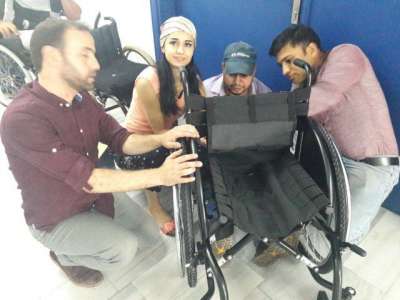
The wheelchair is one of the most commonly used assistive devices for enhancing personal mobility, which is a precondition for enjoying human rights and living in dignity; it also assists people with disabilities to become productive members of their communities.
For many people with disabilities, an appropriate, well-designed and well-fitted wheelchair can be the first step towards inclusion and participation in society. The United Nations’ Convention on the Rights of Persons with Disabilities (CRPD) highlights the responsibility of states to ensure personal mobility. However, in some countries there are very few training opportunities for service providers to ensure that wheelchair users can attain personal mobility with the greatest possible independence, to be productive, and to enjoy a decent quality of life.
To ensure that people with disabilities can access an appropriate wheelchair, the World Health Organisation (WHO) developed guidelines on the provision of manual wheelchairs through wheelchair service training packages (WSTPs). The main purpose of the training packages is to develop the minimum skills and knowledge required by personnel involved in wheelchair service delivery. An important aim is to get the WSTPs integrated into established paramedical/rehabilitation training programmes such as physiotherapy, occupational therapy, prosthetics and orthotics, and rehabilitation nursing.
The Basic Level WSTP is designed to support the training of personnel to provide an appropriate manual wheelchair and cushion for persons who have mobility impairments, but who can sit upright without additional postural support.
The Intermediate Level WSTP focusses on addressing the needs of people who have severe mobility difficulties, have poor trunk control and who cannot sit upright without postural support.
The training packages include:
- Core knowledge about - wheelchair users, wheelchair services, wheelchair mobility; the definition, causes and prevention of pressure ulcers; the definition of an appropriate wheelchair; types of cushions and their use; transfers
- An overview of the key steps of wheelchair service delivery - referral and appointment; assessment, prescription, funding and ordering; product preparation and fitting; user training; maintenance, repair and follow up
Theory is taught alongside the practical training.
The courses I attended were held in Jordan from September to December 2017 by the Al Hussein Society, in collaboration with USAID and World Learning, and was taught by Mobility India. I was given the opportunity to represent the Order of Physiotherapists in Lebanon, and attended the WHO Basic and Intermediate WSTPs as well as the Training of Trainers course (ToT).
The courses were delivered by professional trainers, physiotherapists, occupational therapists and ortho-prosthetists from Mobility India, and we were provided with all the necessary forms, checklists, manuals and guides, including the trainer’s manual and a set of posters and presentations.
This was a pioneering event and should see the beginning of changes in wheelchair service delivery in the region . In Lebanon the health system is not very developed within this field; there is no certificate, nor a curriculum at the universities.
Twenty years ago, wheelchair service delivery was unknown in Lebanon; wheelchairs were given to users as a mobility aid without any posture management. Assessment, fitting and follow up hardly existed. Service development started with the personal initiatives of people believing in this field. My own experience began twenty years ago as the physiotherapist responsible for the Technical Aids Unit at SESOBEL, which is a non-governmental organisation founded in 1976 for the welfare of children with disabilities and their families. SESOBEL takes all possible steps to implement a coherent and monitored service for assisting children with disabilities, and to support their families as partners in facing life’s challenges. It works equally hard in the rest of society to teach respect for the value and dignity of children with disabilities.
At SESOBEL every child is considered unique, and an appropriate programme is designed to meet their specific needs. We use an holistic and multidisciplinary approach which considers the child’s needs on every level, including a wheelchair service where we provide assessments, and manufacture different kinds of seating equipment in the centre and in the home. These include customised insert chairs and contoured cushions using wood, foam and Dartex as raw materials. We also do fitting, repairs and follow up.
Over the years I have attended a range of training by international experts at conferences, courses abroad, internships on products, and have also learned through trial and error. I have been able to develop some standards and establish an assessment sheet and procedures to meet the needs of all beneficiaries in accordance with our environment, and dependent on the resources available in our country.
The WSTPs helped consolidate the knowledge I have acquired over many years in a more structured way (theory and practice). The courses covered basic topics needed in wheelchair service delivery, and validated much of the work we have been doing.
The WSTP basic content is about the sitting posture, its objectives, the problems caused by a destructive sitting posture, the benefits of an appropriate wheelchair, and how the pelvis affects the way we sit. Pressure ulcers are considered in detail. In addition, there is a section about wheelchair types and accessories, plus cushions essential for any sitting position. Transferring is also covered, with different transfer techniques demonstrated.
At the intermediate level, the course includes learning about the requirements for people with complex postural problems, covering several conditions as well as different postures acquired from infancy to adulthood.
In both the basic and intermediate packages, 7 steps of wheelchair service delivery are laid out clearly. Each step is described thoroughly, with details concerning the user and the equipment prescribed (from the appointment to the delivery), in line with the international guidelines.
The training held in Jordan promises changes at a national level in Lebanon. Because it is WHO-certified training, we can now act officially in influential areas - governmental, academic, as well as with non-governmental organisations working in the field. We can provide courses at the universities, and even review and amend laws.
References:
The United Nations Convention on the Rights of People with Disabilities






.jpg)



no comments
Add your comment...